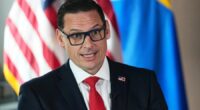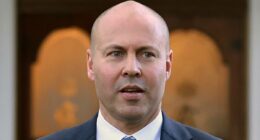Share this @internewscast.com
Emmanuel Macron faced an unexpected situation this week when New York City police halted his vehicle, requiring him to wait on the street to clear the path for Donald Trump’s motorcade.
Footage shows the perplexed French president stranded on a road moments after he left the UN headquarters in the Big Apple on Monday.
‘I’m really sorry, Mr President, everything is frozen’, a police officer can be heard telling Macron.
Taking swift action, the French president was captured in another video reaching out to the American president via phone.
‘Guess what, I’m waiting in the street right now because everything is frozen for you,’ he appears to tell Trump.
However, after a prolonged wait, Macron and his security detail ended up walking along the street once the areas reopened for pedestrian access.
The footage of this uncomfortable event quickly went viral on social media, sparking discussions about the perceived assertion of authority by the US president.
“That’s more than a simple mix-up — it’s a demonstration of power. When world leaders have to wait so Trump can proceed, it speaks volumes about who commands the room,” one commenter on X expressed.

Emmanuel Macron was forced to get out of his vehicle and wait on the streets of New York to make way for Donald Trump’s motorcade

Footage shows the perplexed French president stranded on a road moments after he left the UN headquarters in the Big Apple on Monday
Another said: ‘Macron learns who runs thing in America, even off duty’.
“It’s humiliating to see the French president waiting at the curb while Trump’s convoy passes with a regal presence,” noted another user, while someone else added: “This isn’t merely an ‘awkward moment’. It’s a breach of protocol and a substantial affront.”
The mishap involving Macron comes after new polling data revealed yesterday that his popularity in France has plunged to an all-time low.
The embattled president’s approval rating has fallen to 17%, the lowest it has been since taking office in 2017.
The results of the Ifop survey conducted for French weekly Le Journal du Dimanche came after nearly one million workers and anti-austerity marchers took to the streets to protest Macron’s handling of France’s economy.
As the country endured outbursts of carnage and violence, images from the streets of the capital last Thursday showed major clashes breaking out between cops and rioters.
Protesters set fire to wooden pallets outside the city’s main train station, the Gare du Nord, while officers battled crowds of demonstrators in billowing clouds of tear gas smoke.

Macron resorted to calling his American counterpart

The French president was then seen walking down the street with his bodyguards after roads reopened, but only for pedestrians
Masked students carrying banners and placards calling to ‘tax the rich’ also waved red flares in front of armoured police as they blocked the entrance of the Lycee Maurice Ravel high school as part of the nationwide protests against the government’s budget cut plans.
The strikes, among the latest humiliation for President Emmanuel Macron, came barely a week after Sébastien Lecornu was appointed prime minister following the toppling of Francois Bayrou’s government.
Unions have called for more spending on public services, higher taxes on the wealthy and for the budget cuts outlined by the short-lived Bayrou government to be axed.
Macron has been battered by several major uprisings, including the Yellow Vest protest in 2018 and the pension reforms revolt in 2023.
His current predicament is seen as one he created. Last year, in an attempt to delivery a healthy majority ahead of Paris’ Olympics, he called a snap election.
But this move backfired, resulting in a hung parliament that has made legislation even more difficult to pass.
This difficulty has left France with a swelling public debt crisis, aggravated by the pandemic, a major European energy crisis and high global interest rates.
France’s deficit rose to 5.8% of its GDP last year, far surpassing the 3% limit set by the EU.
It is the largest deficit France has had since the end of World War II.
















